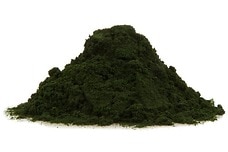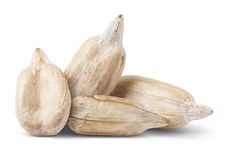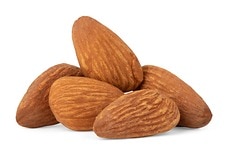Food & Snack Sources of B Vitamins
Unlike some other vitamins -- vitamin E and vitamin C -- vitamin B is not a single compound but a class of nutrients that are vital for optimal human functioning. Sometimes called B vitamin complex, the B vitamins serve as important cofactors that facilitate important metabolic processes.
What Are the B Vitamins and What Do They Do?
The B vitamins share similar names but are actually chemically distinct from one another. Each of the vitamins has a number (e.g., vitamin B1) as well as a chemical name (e.g., thiamine). All of these vitamins are water soluble, meaning that excess amounts that are ingested may be excreted by the body. Following are the eight compounds that make up the B-complex vitamins as well as their primary activities in the human body:
- Vitamin B1 (thiamine). Thiamine serves as a coenzyme that facilitates the breakdown of carbohydrates and amino acids (Erlich, 2015).
- Vitamin B2 (riboflavin). Riboflavin undergoes a chemical reaction to form two chemicals, FAD and FMN, which help to activate other vitamins. Thus, getting enough riboflavin is essential for facilitating the action of a range of vitamins within the body.
- Vitamin B3 (niacin). Niacin is a precursor of important enzymes needed to create fatty acid and cholesterol molecules. Vitamin B5 (pantothenic acid). Pantothenic acid is converted into coenzyme A, an essential molecule for the metabolism of fatty acids and energy generation.
- Vitamin B6 (pyridoxine). Pyridoxine helps the body create neurotransmitters, which convey messages between nerve cells (Gregory, 2015). These neurotransmitters go on to regulate mood and circadian rhythms.
- Vitamin B7 (biotin). Biotin is necessary for the creation of glucose molecules. It is thought to support the growth of the hair and nails.
- Vitamin B9 (folic acid). Folic acid is an essential vitamin for the repair of DNA. It plays a large role in cell division, making it especially important for a healthy pregnancy.
- Vitamin B12 (cyanocobalamin, methylcobalamin). The cobalamins collectively are called vitamin B12. These compounds are present in every cell in the human body (Erlich, 2015). Cobalamins are particularly important for the synthesis of DNA and nutrient metabolism.
All of the B vitamins work together to support health. For example, getting enough thiamine is associated with lower levels of depression, better immune system activity, and reduced risk of cataracts (Erlich, 2015). Vitamin B6 appears to reduce risk of cardiovascular disease, age-related cognitive decline, and cancer (Gregory, 2015). Vitamin B9, or folic acid, is particularly important for pregnant women. Failure to get enough folic acid before and during critical stages of pregnancy can result in neural tube defects such as spina bifida or anencephaly (National Institutes of Health [NIH], 2015). Collectively, getting these important B vitamins can protect you against a range of chronic health conditions.
The recommended daily intake of B vitamins differs between the eight different vitamins in this complex. The recommendations are as follows (NIH, 2015):
- Vitamin B1 (thiamine). Men should aim to get 1.2 mg of thiamine each day, while adult women need 1.1 mg. During pregnancy, women should aim for 1.4 mg, while breastfeeding women need 1.5 mg daily.
- Vitamin B2 (riboflavin). Adult men need 1.3 mg of riboflavin, while women need 1.1 mg. Pregnant and breastfeeding women should get 1.4 mg and 1.6 mg, respectively.
- Vitamin B3 (niacin). Adult men need 16 mg of niacin per day. Women need 14 mg, while pregnant women should get 18 mg daily.
- Vitamin B5 (pantothenic acid). Men and women need 5 mg of pantothenic acid each day. Pregnant women should aim for 6 mg, while breastfeeding women need 7 mg.
- Vitamin B6 (pyridoxine). Men and women under age 50 need 1.3 mg of pyridoxine per day. After age 51, men need 1.7 mg daily while women need 1.5 mg. Pregnant women need 1.9 mg while breastfeeding women need 2 mg per day.
- Vitamin B7 (biotin). Aim for 35 micrograms of biotin daily.
- Vitamin B9 (folic acid). Adult men and women need 400 micrograms of folic acid per day. Folic acid is particularly important for pregnant women to prevent birth defects. Thus, pregnant women should be sure to get 600 micrograms daily, while breastfeeding women need 500 micrograms.
- Vitamin B12 (cyanocobalamin, methylcobalamin). Men and women need 2.4 micrograms of vitamin B12 per day. Pregnant women should aim for 2.6 micrograms while breastfeeding women need 2.8 micrograms.
Symptoms of B Vitamin Deficiency
Vitamin B deficiency typically results from difficulty absorbing nutrients from food. For example, people with Crohn’s disease are at risk for B-complex vitamin deficiency because their intestinal problems lead to nutrient malabsorption (McNulty, 2014). Confusion, anemia, skin conditions, gastrointestinal distress, depression, and tingling in the hands or feet are common signs of vitamin B deficiency. These symptoms often alleviate when a person begins getting enough vitamin B again; however, some symptoms may be irreversible.
In particular, lack of vitamin B1 (thiamine) leads to a type of dementia known as Wernicke-Korsakoff syndrome (Erlich, 2015). Often seen in chronic alcoholics who do not have other sources of nutrition, the profound memory impairment observed in Wernicke-Korsakoff syndrome does not resolve even after giving high doses of thiamine.
The Best Food Sources of B Vitamins
B-complex vitamins are readily available in supplement form. However, the best source of B vitamins is from whole foods. This is because the vitamins often work synergistically with other nutrients that are naturally present in food, magnifying their beneficial effects. Certain forms of B vitamins have a higher bioavailability when obtained through food versus through a supplement (Gregory, 2015). To ensure you get enough, consider the following food sources for the eight B vitamins:
- Vitamin B1. Beans, seeds, and nuts are excellent sources of thiamine. Choose sunflower seeds, navy beans, black beans, lentils, or dried peas to get your daily recommended intake of this valuable vitamin.
- Vitamin B2. Many vegetables are rich in vitamin B2. Eat cruciferous vegetables such as Brussels sprouts, cabbage, or broccoli to ensure you get enough.
- Vitamin B3. Tuna, turkey, chicken, and lamb are good dietary sources of vitamin B3. For non-animal sources of the vitamin, eat peanuts or brown rice.
- Vitamin B5. To get enough vitamin B5, eat mushrooms, cheese, fatty fish such as mackerel or tuna, avocados, or sweet potatoes.
- Vitamin B6. Salmon, potatoes, avocados, dried plums, bananas, spinach, and hazelnuts are good sources of vitamin B6.
- Vitamin B7. Nuts are an excellent source of biotin, with peanuts, walnuts, and almonds having particularly high amounts. Sweet potatoes, eggs, and oats are other good sources of this vitamin.
- Vitamin B9. Lentils, chickpeas, asparagus, spinach, and orange juice are good natural sources of folic acid. Pasta, bread, and other products are typically fortified with this nutrient to ensure you get enough.
- Vitamin B12. Vitamin B12 is naturally found in fish, poultry, eggs, meat, and dairy products. Getting enough vitamin B12 is of particular importance to people following a vegetarian or vegan diet, as it is primarily found in animal products. Eating fortified breakfast cereals or fortified nutritional yeast products are acceptable non-animal sources of the vitamin.
In general, eating a varied diet with plenty of fruits, vegetables, nuts, beans, and whole grains will help you get the B vitamins you need to thrive.
Healthy Recipes for Getting B-Vitamins
The following recipes are rich in different varieties of B vitamins and feature a balanced intake of additional vitamins to supply a palatable part of a complete diet.
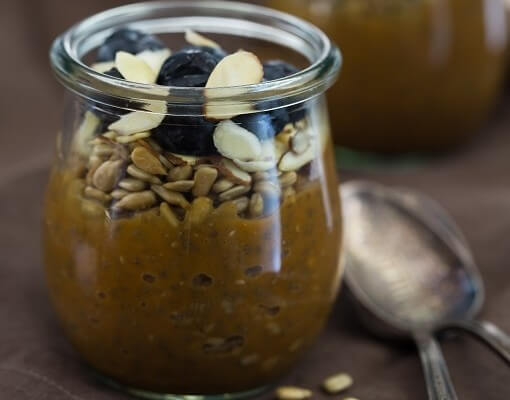
Pumpkin Chia Seed Pudding Recipe
This pudding contains seeds, pumpkin and nuts to offer three foods that are each rich sources in different B vitamins, including significant amounts of thiamine and biotin. It is also packed with other essential vitamins and minerals and important macronutrients like protein and fiber.
Ingredients: Milk, pumpkin puree, chia seeds, maple syrup, pumpkin spice, sunflower seeds, sliced almonds, fresh blueberries.
Total Time: 10 minutes
| Yield: 4 servings
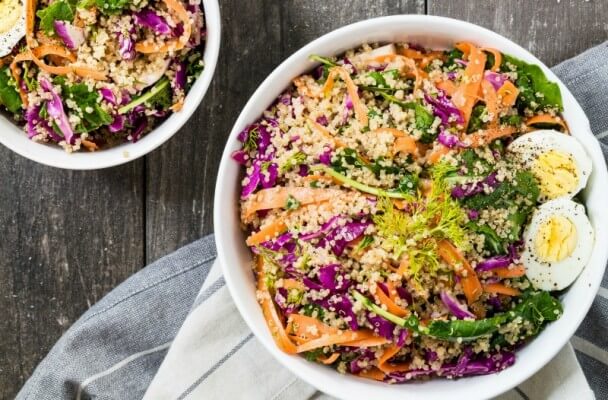
Kale Quinoa Salad Recipe
Kale, eggs, and cabbage act as repositories of all sorts of B complex vitamins, including: riboflavin, biotin, folic acid, and cobalamins. The dish is a true delight with a unique flavor and pleasant presentation that act as the perfect means of meeting your dietary requirements for the day!
Ingredients: Quinoa, fresh baby kale, purple cabbage, carrots, fresh dill, boiled eggs, rice wine, extra virgin olive oil, black pepper.
Total Time: 25 minutes
| Yield: 8 servings
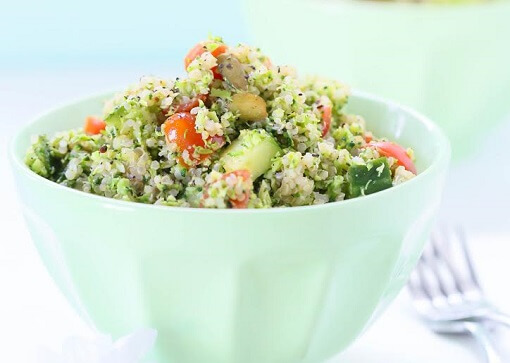
Broccoli Quinoa Salad Recipe {gluten-free}
Broccoli and pumpkin seeds serve as the primary sources of B vitamins, offering a blend of thiamine and riboflavin. Quinoa also supplies some thiamine, but offers decent amounts of both riboflavin and folic acid.
Ingredients: Fresh broccoli, quinoa, cucumber, cherry tomatoes, raw pumpkin seeds, sea salt, black pepper, Dijon mustard (optional), vinegar, extra virgin olive oil, maple syrup.
Total Time: 1 hour
| Yield: 8 servings

Quinoa Stuffed Peppers Recipe {gluten-free}
A combination of quinoa, spinach and lentils covers a wide range of the nutrients, including: thiamine, riboflavin, pyridoxine, and folic acid. The cheese may also add pantothenic acid and cobalamins.
Ingredients: Quinoa, green bell peppers, canned lentils, fresh spinach, feta cheese, frozen corn (thawed), salt, black pepper.
Total Time: 40 minutes
| Yield: 6 servings (8 half-peppers)
B Vitamin Rich Foods
The snacks below were selected due to their status as a source for different B vitamins. While not every food contains every B vitamin, many selections are sources of multiple forms of the nutrient.
Healthy Eating
- Healthy Highlights
- 5 Uses for Cacao Powder
- 5 Ways to Eat Farro
- 6 Best Gluten-Free Foods
- Alcohol and the Body
- Almond Flour Recipes
- Anti-Aging Superfoods
- Beat the Afternoon Slump
- Benefits of a Plant-Based Diet
- Benefits of Baobab
- Benefits of Cashews
- Benefits of Coconut Oil for Hair
- Benefits of Coconuts
- Benefits of Dates
- Benefits of Fenugreek
- Benefits of Garcinia Cambogia
- Benefits of Goji Berries
- Benefits of Kale Chips
- Benefits of Monk Fruit Sweetener
- Benefits of Peanuts
- Benefits of Pecans
- Benefits of Pistachios
- Benefits of Pumpkin Seeds
- Benefits of Spelt Flour
- Benefits of Steel Cut Oats
- Benefits of Sunflower Seeds
- Benefits of Tiger Nuts
- Benefits of Turmeric
- Benefits of Walnuts
- Benefits of Wheatgrass
- Best Food Fads
- Cacao vs Cocoa
- Caffeine-Free Energy Foods
- Chocolate That's Good for You
- Diet vs. Exercise
- Fat Burning Foods
- Food Myths Debunked
- Foods for Bone Density
- Foods for Colon Health
- Foods for Healthy Hair
- Foods for Healthy Skin
- Foods to Help Sleep
- Foods to Reduce Stress
- Green Tea Benefits
- Healthy Baking Flours
- Heart Healthy Habits
- High Protein Health Risks
- How to Boost Your Metabolism
- How to Lose Weight While Aging
- How to Throw a Vegan BBQ
- Kaniwa vs Quinoa
- Little Health Foods
- Low-Carb: Fad or Friend?
- Making Healthier Desserts
- Mediterranean Diet Meal Plan
- Natural Beauty Products
- Nuts for Weight Loss
- Preparing Vegan Meals
- Preventing Muscle Degeneration
- Rare Superfoods
- Reduce Sugar Intake
- Save Time By Going Vegan
- Smarter Snack Swaps
- Smoothie Ingredients
- Soy Protein vs Whey Protein
- Starting a Plant-Based Diet
- Steel Cut vs Rolled Oats
- Sugar Substitutes
- Vegan Proteins
- Vegan Substitutions for Fall Recipes
- Why Go Vegan
- Healthy Meals
- Healthy Recipes
- Sports Nutrition
- Nutrition and Special Diets
- 21 Day Fix
- 5 Popular Diet Similarities
- Alkaline Diet
- Anti-Inflammatory Diet
- Calorie Counting
- Carb Cycling Diet
- Celiac Disease
- Cholesterol
- Clean Eating
- Crohn's Disease
- DASH Diet
- Detox Diet
- Diabetes
- Diabetes Diet
- Diet Pill Dangers
- Fat Burning Foods
- Gluten-free Diet
- Glycemic Index
- Heart Health
- High Blood Pressure Diet
- High Fiber Foods
- How to Eat Healthy
- How to Lower Blood Pressure
- Hypertension
- IBS Diet
- Ketogenic Diet
- Liquid Diet
- Low GI Foods
- Low-Carb Diet and Foods
- Low-Fat High-Carb Diet
- Mediterranean Diet
- Mediterranean Diet Foods
- Military Diet
- Nutrition Labels Explained
- Paleo Diet
- Raw Food Diet
- Superfoods
- Sustainable Weight Loss
- Thrive Diet
- Vegan Diet
- Vegetarian Diet
- Weight Loss Shakes
- Whole30
- Vitamins, Minerals & Nutrients

